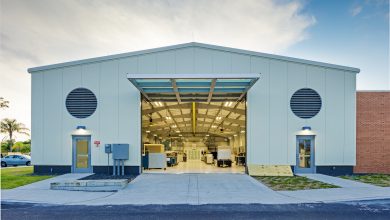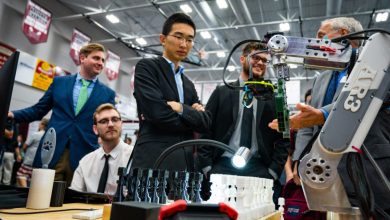Providing enlightenment through energy education
Double majoring in STEM education and mechanical engineering, Shelby Pearce had been looking for a way to tie the two disciplines together when she decided to do her senior design project on energy education. Her work earned her best in show for education and interdisciplinary sciences during this year’s Northrop Grumman Engineering and Science Design Showcase.
“My father works in energy generation, so I have grown up hearing about power plants and electricity,” says Shelby. “Since childhood, I’ve always been curious about the world around me and how things worked and related to one another.”
Shelby realized as she grew older, that almost every aspect of daily life is ingrained with energy production and use. She began to ponder and question the accepted definitions of energy, and sought an explanation that fully encompassed her observations.
Shelby is working on ways to draw attention to the bigger picture through energy education. “In a science textbook, energy is defined as the ability to do work,” she points out. “But if you look at energy from a socio-economic perspective, energy is a gateway to an improved quality of life.”
Exemplary Inspiration through Capitalistic Innovation
A recent article from NPR discussed how a village in Haiti has started using a biomass generator to produce energy. The villagers use the generator to power refrigerators and freezers to keep cold drinks and ice cream, and Shelby found their story exemplary and very inspiring.
“They sell the ice cream to people passing through,” she says. “To these people, just the ability to sell a few cold drinks is a new prospect that has changed their daily life.”
“The world’s desire for energy resources directly relates to economics, politics, and the environment,” says Shelby. “This got me thinking about how well people understand this concept and how it relates to them.”
The Game Plan
In order to investigate this, Shelby conducted extensive interviews to build a case study. She interacted with two novices on the topic, someone on the intermediate level, and finally an expert.
“The novices I interviewed were children aged six and nine,” she says. “The intermediate was a college engineering student and the expert was the general manager of nuclear projects for NextEra Energy.”
With insights gained from the interview process, Shelby created a baseline of thought processes that could be further explored and elaborated on. “With the knowledge gained from the interviews, I am developing a series of energy surveys that will be distributed to a larger population size so that a more general consensus can be made.”
The Uneasily Avoidable Speedbumps
Energy education is a very broad subject and Shelby found herself wanting to address many intertwining facets of it. “I found that the interviews did not provide any numerical data, so it is difficult to draw conclusions or discover trends,” she added. “Every interview was different and each time, the topic took a slightly different course.”
The Bigger Picture of Energy Education
Shelby’s biggest take-away from her project was there was a lot of misconceptions about energy. Novice to intermediate interviewees were unable to see the connection between energy sources and their daily lives.
“They understood general concepts, but did not understand how everything links together in their everyday lives,” she says. “This was supported by my interview with the expert who believes that people are not educated properly on the interconnectivity of energy.”
Shelby strongly believes that educators need to start tying their lessons into the “real world” and not just teach students from textbooks.
“The more a student views a topic as relevant to their life, the more likely they are to learn and absorb the information,” she says. “We want students to be educated in the concept of energy since they will have to make political, economic, and environmental decisions related to it.”
Shelby is far from finished with her work, and would advise future senior design presenters to explain why their project matters. “You can have an awesome project, but if you don’t demonstrate the significance of it, then it may not make the impact you had hoped.”





